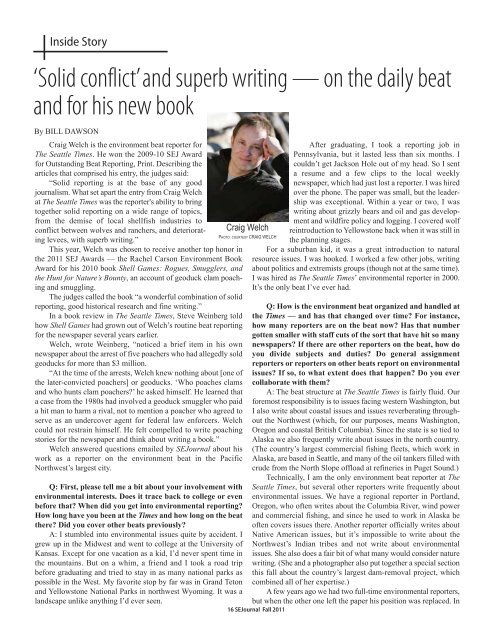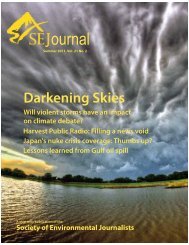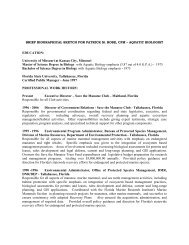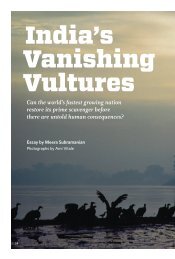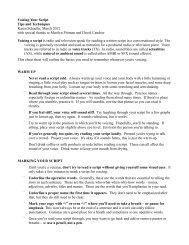PDF Download - Society of Environmental Journalists
PDF Download - Society of Environmental Journalists
PDF Download - Society of Environmental Journalists
Create successful ePaper yourself
Turn your PDF publications into a flip-book with our unique Google optimized e-Paper software.
Inside Story<br />
‘Solid conflict’ and superb writing — on the daily beat<br />
and for his new book<br />
By BILL DAWSON<br />
Craig Welch is the environment beat reporter for<br />
The Seattle Times. He won the 2009-10 SEJ Award<br />
for Outstanding Beat Reporting, Print. Describing the<br />
articles that comprised his entry, the judges said:<br />
“Solid reporting is at the base <strong>of</strong> any good<br />
journalism. What set apart the entry from Craig Welch<br />
at The Seattle Times was the reporter's ability to bring<br />
together solid reporting on a wide range <strong>of</strong> topics,<br />
from the demise <strong>of</strong> local shellfish industries to<br />
conflict between wolves and ranchers, and deteriorating<br />
levees, with superb writing.”<br />
This year, Welch was chosen to receive another top honor in<br />
the 2011 SEJ Awards — the Rachel Carson Environment Book<br />
Award for his 2010 book Shell Games: Rogues, Smugglers, and<br />
the Hunt for Nature’s Bounty, an account <strong>of</strong> geoduck clam poaching<br />
and smuggling.<br />
The judges called the book “a wonderful combination <strong>of</strong> solid<br />
reporting, good historical research and fine writing.”<br />
In a book review in The Seattle Times, Steve Weinberg told<br />
how Shell Games had grown out <strong>of</strong> Welch’s routine beat reporting<br />
for the newspaper several years earlier.<br />
Welch, wrote Weinberg, “noticed a brief item in his own<br />
newspaper about the arrest <strong>of</strong> five poachers who had allegedly sold<br />
geoducks for more than $3 million.<br />
“At the time <strong>of</strong> the arrests, Welch knew nothing about [one <strong>of</strong><br />
the later-convicted poachers] or geoducks. ‘Who poaches clams<br />
and who hunts clam poachers’ he asked himself. He learned that<br />
a case from the 1980s had involved a geoduck smuggler who paid<br />
a hit man to harm a rival, not to mention a poacher who agreed to<br />
serve as an undercover agent for federal law enforcers. Welch<br />
could not restrain himself. He felt compelled to write poaching<br />
stories for the newspaper and think about writing a book.”<br />
Welch answered questions emailed by SEJournal about his<br />
work as a reporter on the environment beat in the Pacific<br />
Northwest’s largest city.<br />
Q: First, please tell me a bit about your involvement with<br />
environmental interests. Does it trace back to college or even<br />
before that When did you get into environmental reporting<br />
How long have you been at the Times and how long on the beat<br />
there Did you cover other beats previously<br />
A: I stumbled into environmental issues quite by accident. I<br />
grew up in the Midwest and went to college at the University <strong>of</strong><br />
Kansas. Except for one vacation as a kid, I’d never spent time in<br />
the mountains. But on a whim, a friend and I took a road trip<br />
before graduating and tried to stay in as many national parks as<br />
possible in the West. My favorite stop by far was in Grand Teton<br />
and Yellowstone National Parks in northwest Wyoming. It was a<br />
landscape unlike anything I’d ever seen.<br />
Craig Welch<br />
PHOTO: COURTESY CRAIG WELCH<br />
After graduating, I took a reporting job in<br />
Pennsylvania, but it lasted less than six months. I<br />
couldn’t get Jackson Hole out <strong>of</strong> my head. So I sent<br />
a resume and a few clips to the local weekly<br />
newspaper, which had just lost a reporter. I was hired<br />
over the phone. The paper was small, but the leadership<br />
was exceptional. Within a year or two, I was<br />
writing about grizzly bears and oil and gas development<br />
and wildfire policy and logging. I covered wolf<br />
reintroduction to Yellowstone back when it was still in<br />
the planning stages.<br />
For a suburban kid, it was a great introduction to natural<br />
resource issues. I was hooked. I worked a few other jobs, writing<br />
about politics and extremists groups (though not at the same time).<br />
I was hired as The Seattle Times’ environmental reporter in 2000.<br />
It’s the only beat I’ve ever had.<br />
Q: How is the environment beat organized and handled at<br />
the Times — and has that changed over time For instance,<br />
how many reporters are on the beat now Has that number<br />
gotten smaller with staff cuts <strong>of</strong> the sort that have hit so many<br />
newspapers If there are other reporters on the beat, how do<br />
you divide subjects and duties Do general assignment<br />
reporters or reporters on other beats report on environmental<br />
issues If so, to what extent does that happen Do you ever<br />
collaborate with them<br />
A: The beat structure at The Seattle Times is fairly fluid. Our<br />
foremost responsibility is to issues facing western Washington, but<br />
I also write about coastal issues and issues reverberating throughout<br />
the Northwest (which, for our purposes, means Washington,<br />
Oregon and coastal British Columbia). Since the state is so tied to<br />
Alaska we also frequently write about issues in the north country.<br />
(The country’s largest commercial fishing fleets, which work in<br />
Alaska, are based in Seattle, and many <strong>of</strong> the oil tankers filled with<br />
crude from the North Slope <strong>of</strong>fload at refineries in Puget Sound.)<br />
Technically, I am the only environment beat reporter at The<br />
Seattle Times, but several other reporters write frequently about<br />
environmental issues. We have a regional reporter in Portland,<br />
Oregon, who <strong>of</strong>ten writes about the Columbia River, wind power<br />
and commercial fishing, and since he used to work in Alaska he<br />
<strong>of</strong>ten covers issues there. Another reporter <strong>of</strong>ficially writes about<br />
Native American issues, but it’s impossible to write about the<br />
Northwest’s Indian tribes and not write about environmental<br />
issues. She also does a fair bit <strong>of</strong> what many would consider nature<br />
writing. (She and a photographer also put together a special section<br />
this fall about the country’s largest dam-removal project, which<br />
combined all <strong>of</strong> her expertise.)<br />
A few years ago we had two full-time environmental reporters,<br />
but when the other one left the paper his position was replaced. In<br />
16 SEJournal Fall 2011


